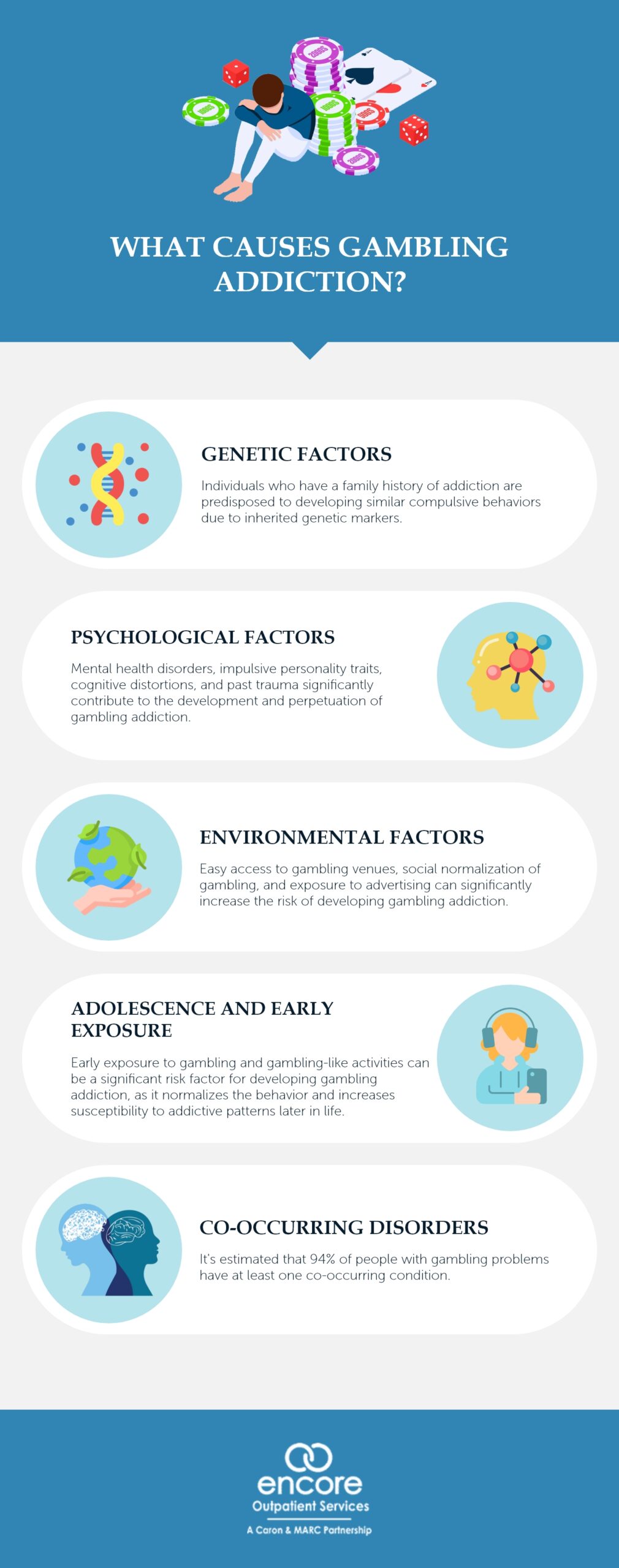Our dedication lies not just in treating symptoms but in addressing the root causes, offering a holistic approach that integrates the best of therapeutic practices with the warmth of community support.
What Causes Gambling Addiction?

Imagine a world where the thrill of placing a bet becomes more than just a pastime, and the rush of winning or losing money takes over your thoughts and actions. This is the reality of gambling addiction. A complex and multifaceted condition that can have devastating consequences on a person’s life. In this blog post, we’ll explore the various risk factors that contribute to the development of gambling addiction. Shedding light on influences that play a role in this potentially destructive behavior.
Genetic Factors
There are several genetic factors that can contribute to the development of gambling addiction:
- Family History: Individuals with a family history of gambling problems or addiction are more likely to develop a gambling disorder themselves.
- Genetic Predisposition: Certain genetic markers are associated with impulsivity and risk-taking behaviors, which are common traits in those with a gambling disorder.
- Brain Chemistry: Genetic variations can influence how the brain’s reward system responds to gambling, making some individuals more susceptible to addictive behaviors.
While genetic risk factors alone don’t determine whether someone will develop a gambling addiction, they can increase the likelihood of it occurring.
Psychological Factors
Here are some psychological factors that lead to compulsive gambling:
- Mental Health Disorders: Individuals with mental health conditions such as depression, anxiety, and bipolar disorder are more likely to develop gambling problems. Gambling may be used as a coping mechanism to deal with emotional distress.
- Personality Traits: Individuals with certain personality traits, such as impulsivity, sensation-seeking, and low self-control, are more likely to engage in gambling activities and develop addictive behaviors.
- Cognitive Distortions: Individuals with gambling disorder often exhibit cognitive distortions, such as the illusion of control (believing they can influence the outcome of random events) and the gambler’s fallacy (believing that past outcomes affect future probabilities).
- Trauma and Past Experiences: Individuals who have experienced trauma or adverse life events may use gambling as a way to cope with unresolved emotional pain. The escapism provided by gambling can temporarily soothe emotional distress.
By recognizing these common risk factors, mental health professionals can develop targeted treatment strategies and provide effective support for individuals struggling with gambling addiction.

Neurological Factors
Here are the key neurological factors that contribute to compulsive gambling:
- Brain Reward System: Gambling activates the brain’s reward system, releasing dopamine, a neurotransmitter associated with pleasure and reward. This dopamine surge creates a “high” that can be highly addictive.
- Dopamine Regulation: Individuals with gambling addiction often have differences in dopamine regulation. They may have a heightened response to the anticipation of rewards, which can drive compulsive gambling behavior.
- Desensitization of Reward System: Excessive gambling can desensitize the brain’s reward system, making it harder for individuals to experience pleasure from everyday activities. This drives the need for the “high” associated with gambling habits.
- Prefrontal Cortex Function: The prefrontal cortex, responsible for decision-making and impulse control, often shows reduced activity in individuals with gambling addiction. This can lead to impaired judgment and increased risk-taking.
- Neuroplasticity: Repeated gambling behavior can alter brain structure and function, reinforcing the addiction. This neuroplasticity can make it more difficult to break the cycle of addiction without professional treatment.
- Cognitive Control Networks: Disruptions in the brain’s cognitive control networks can affect an individual’s ability to resist gambling urges and manage cravings, contributing to addiction.
- Traumatic Brain Injury (TBI): Studies indicate that traumatic brain injury is an important risk factor for the development of gambling disorder. Adults with a history of TBI have a 27% higher risk of developing problem gambling.
These neurological alterations can reinforce the addictive cycle of gambling, making it difficult for you to break free from your compulsive behavior without professional help and support.
Environmental Factors
Here are the key environmental factors that can contribute to gambling addiction:
- Accessibility and Availability: The ease of access to gambling venues, such as casinos, betting shops, and online gambling sites, can increase the likelihood of developing a gambling problem. Areas with a high density of gambling establishments often see higher rates of gambling addiction.
- Social Environment: Growing up or living in an environment where gambling is normalized or encouraged can increase the risk of developing a gambling addiction. Observing family members or friends who gamble can lead to adopting similar behaviors.
- Economic Stress: Financial issues and economic hardship can drive individuals to gamble in hopes of winning money. The illusion of quick financial gain can make gambling particularly appealing to those in financial distress.
- Advertising and Media Influence: Aggressive marketing and advertising by the gambling industry can glamorize gambling and make it seem attractive. Media portrayal of gambling as an exciting and lucrative activity can influence some to start gambling.
- Cultural Attitudes: Cultural norms and attitudes towards gambling can affect the likelihood of engaging in gambling activities. In some cultures, gambling is seen as a socially acceptable pastime, which can contribute to higher rates of addiction.
- Lack of Community Resources and Support: Neighborhoods with fewer community resources, social services, and support networks may lack the infrastructure to prevent and address gambling-related problems.
Addressing these risk factors is crucial for effective prevention and harm reduction strategies.
Adolescence and Early Exposure
Early exposure to gambling and gambling-like activities is a significant risk factor for developing gambling addiction.
- Developmental Vulnerability: Adolescents are at a crucial developmental stage where their brains are still maturing, particularly the prefrontal cortex, which is responsible for decision-making and impulse control. This makes them more susceptible to risky behaviors, including preoccupation with gambling.
- Social Influence: Young people who are exposed to gambling through family members or friends are more likely to engage in gambling activities themselves. Observing parents or friends gamble can normalize the behavior and increase the likelihood of adolescents trying it.
- Accessibility of Gambling: The rise of online gambling and the proliferation of gambling advertisements make it easier for adolescents to access gambling platforms. This increased accessibility can lead to higher rates of early exposure and subsequent addiction.
- Unhealthy Coping Mechanism: Adolescents may turn to gambling as a way to cope with stress, anxiety, or social pressures. The thrill and excitement of gambling can provide a temporary escape from these issues.
- Lack of Awareness: Young people may not fully understand the risks and potential consequences of gambling. Early exposure without proper education about the dangers can lead to the development of problematic gambling behaviors.
- Impact of Wins: Early experiences of winning can create a false sense of skill and control over gambling outcomes, reinforcing the behavior and increasing the risk of addiction.
Early exposure to gambling-like elements in video games can normalize gambling behaviors and desensitize young people to the risks involved. This can increase the likelihood of transitioning from online gaming to real-money gambling as they get older.
Addressing these factors during the critical developmental period of adolescence can help prevent the progression to more severe gambling problems in adulthood.
Co-occurring Disorders
People with gambling addiction often experience co-occurring mental health disorders, such as:
- Substance Use Disorders: Gambling problems are often associated with substance use disorders, such as alcohol, drugs, or nicotine use, in both adults and adolescents.
- Depression and Anxiety: Gambling problems are linked to higher rates of depression, anxiety, and other mood disorders.
- Suicidal Ideation and Attempts: Individuals with gambling problems have significantly higher rates of suicidal ideation and attempts. This is a critical concern, especially among young people.
- Attention Deficit Hyperactivity Disorder (ADHD): Conditions like ADHD are more common among young people with gambling problems. These co-occurring disorders can exacerbate addictive gambling behaviors.
- Borderline Personality Disorder (BPD): Studies suggest that borderline personality disorder is particularly high in people with gambling disorder, especially among youth. Around 15% of people with problem gambling have BPD.
According to the New York Council on Problem Gambling (NYCPG), 94% of people with gambling problems have at least one co-occurring condition.
The presence of co-occurring disorders can increase the risk of relapse if both conditions are not adequately treated. Effective treatment with ongoing support and monitoring are crucial to manage both disorders simultaneously.
Impact of Technology
Here are ways technology has influenced the landscape of gambling and the development of gambling addiction:
- Accessibility: Online gambling platforms and mobile apps have made gambling more accessible than ever before. Individuals can gamble from the comfort of their homes or on the go, increasing the frequency and duration of gambling sessions.
- Anonymity: The anonymity provided by online gambling can lead to more secretive and compulsive gambling behaviors. Individuals may feel less inhibited and more willing to take risks without the social scrutiny present in physical gambling venues.
- Engaging Features: Advanced technology has enhanced the user experience with high-quality graphics, interactive features, and instant play options. These engaging elements can make online gambling more appealing and addictive.
- Targeted Advertising: The use of data analytics allows gambling companies to target individuals with personalized advertisements and promotions. This targeted marketing can increase the temptation to gamble, especially for those who are vulnerable to addiction.
- 24/7 Availability: Online gambling is available around the clock, providing continuous opportunities to gamble. This constant availability can exacerbate gambling addiction, as individuals have no enforced breaks or closing times.
- Virtual Currency: The use of virtual currency in online gambling can desensitize individuals to the value of real money, leading to higher spending and greater financial risk.
- Social Media Influence: Social media platforms often promote gambling through advertisements, influencer endorsements, and peer interactions. This exposure can normalize gambling and encourage participation, particularly among younger audiences.
- Regulation Challenges: The rapid growth of online gambling presents challenges for regulation and enforcement. Ensuring that online gambling operators comply with responsible gambling practices and protecting consumers can be difficult.
Understanding the impact of technology on gambling highlights the need for updated regulations, increased public awareness, and the development of strategies to mitigate the risks associated with online gambling platforms.
If you or a loved one is struggling with gambling addiction, Encore Outpatient Services offers comprehensive and personalized treatment programs designed to address the underlying psychological, genetic, and environmental factors contributing to addiction. Our dedicated team provides evidence-based therapies and continuous support to help you achieve lasting wellness. Take the first step toward a healthier life by contacting Encore Outpatient Services today to learn more about our programs and how we can help.
Let Us Support You On Your Recovery Journey!
Copyright 2025 Encore Outpatient Services | All Rights Reserved



